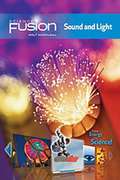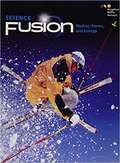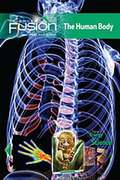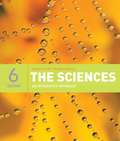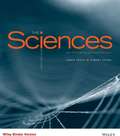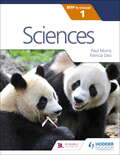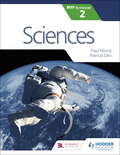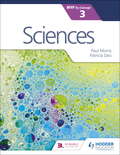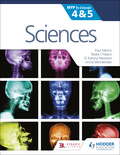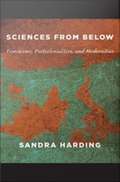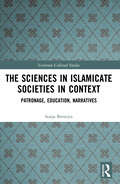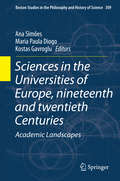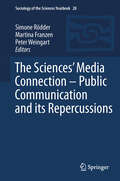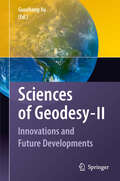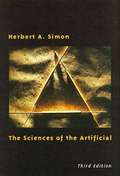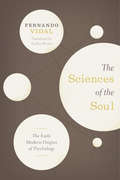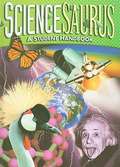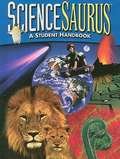- Table View
- List View
Sciencefusion: Student Edition Interactive Worktext Grades 6-8 Module J: Sound And Light 2012 (Sciencefusion)
by Houghton Mifflin Harcourt Publishing Company StaffA science textbook
ScienceFusion Interactive Worktext: Module I: Motion, Forces, And Energy
by Houghton Mifflin Harcourt StaffScienceFusion: Student Edition Interactive Worktext Module I: Motion, Forces, and Energy 2017
ScienceFusion, Module C: The Human Body (Interactive Worktext Grades 6-8,)
by The Editors at the Holt McDougalThis book with a student centred approach features: Learning science concepts and vocabulary Building inquiry, STEM, and 21st Century Skills Incorporating math and writing in each science lesson.
The Sciences: An Integrated Approach (Sixth Edition)
by James Trefil Robert M. HazenOver 100,000 readers have relied on Trefil to gain a better understanding of physics, chemistry, astronomy, earth sciences, and biology. The book focuses on the great ideas in each field while showing readers how core scientific principles connect to their daily lives. The sixth edition emphasizes important themes and relationships, along with new real world connections. Scientific American has been added to the book along with completely updated examples. The presentation also employs a more visual approach that includes new illustrations and visuals. In addition, new problems help readers answer the big questions in science.
The Sciences (8th Edition): An Integrated Approach
by James Trefil Robert M. Hazen<P>The Sciences: An Integrated Approach, Binder Ready Version, 8th Edition by James Trefil and Robert Hazen uses an approach that recognizes that science forms a seamless web of knowledge about the universe. <P>This text fully integrates physics, chemistry, astronomy, earth sciences, and biology and emphasizes general principles and their application to real-world situations. <P>The goal of the text is to help students achieve scientific literacy.<P> Applauded by students and instructors for its easy-to-read style and detail appropriate for non-science majors, the eighth edition has been updated to bring the most up-to-date coverage to the students in all areas of science.
Sciences for the IB MYP 1
by Paul MorrisExam Board: IBLevel: MYPSubject: ScienceFirst Teaching: September 2016First Exam: June 2017Develop your skills to become an inquiring learner; ensure you navigate the MYP framework with confidence using a concept-driven and assessment-focused approach to Sciences presented in global contexts.- Develop conceptual understanding with key MYP concepts and related concepts at the heart of each chapter.- Learn by asking questions with a statement of inquiry in each chapter. - Prepare for every aspect of assessment using support and tasks designed by experienced educators.- Understand how to extend your learning through research projects and interdisciplinary opportunities.Contents1 What do scientists do?2 What changes?3 How do living things work?4 What makes change happen?5 How can we study the living world?6 Where do we fit into the world?GlossaryAcknowledgementsIndex
Sciences for the IB MYP 1
by Paul Morris Patricia DeoExam Board: IBLevel: MYPSubject: ScienceFirst Teaching: September 2016First Exam: June 2017Develop your skills to become an inquiring learner; ensure you navigate the MYP framework with confidence using a concept-driven and assessment-focused approach to Sciences presented in global contexts.- Develop conceptual understanding with key MYP concepts and related concepts at the heart of each chapter.- Learn by asking questions with a statement of inquiry in each chapter. - Prepare for every aspect of assessment using support and tasks designed by experienced educators.- Understand how to extend your learning through research projects and interdisciplinary opportunities.
Sciences for the IB MYP 2
by Paul Morris Patricia DeoExam Board: IBLevel: MYPSubject: ScienceFirst Teaching: September 2016First Exam: June 2017Develop your skills to become an inquiring learner; ensure you navigate the MYP framework with confidence using a concept-driven and assessment-focused approach to Sciences presented in global contexts.- Develop conceptual understanding with key MYP concepts and related concepts at the heart of each chapter.- Learn by asking questions with a statement of inquiry in each chapter. - Prepare for every aspect of assessment using support and tasks designed by experienced educators.- Understand how to extend your learning through research projects and interdisciplinary opportunities.Contents list1 Where are we now and where are we going? 2 How do we map matter?3 Who are we? 4 How can we find out? 5 How does our planet work?6 How do we respond to our world?
Sciences for the IB MYP 3
by Paul Morris Patricia DeoA concept-driven and assessment-focused approach to Sciences teaching and learning.- Approaches each chapter with statements of inquiry framed by key and related concepts, set in a global context- Supports every aspect of assessment using tasks designed by an experienced MYP educator- Differentiates and extends learning with research projects and interdisciplinary opportunities- Applies global contexts in meaningful ways to offer an MYP Sciences programme with an internationally-minded perspective
Sciences for the IB MYP 3
by Paul Morris Patricia DeoA concept-driven and assessment-focused approach to Sciences teaching and learning.- Approaches each chapter with statements of inquiry framed by key and related concepts, set in a global context- Supports every aspect of assessment using tasks designed by an experienced MYP educator- Differentiates and extends learning with research projects and interdisciplinary opportunities- Applies global contexts in meaningful ways to offer an MYP Sciences programme with an internationally-minded perspective
Sciences for the IB MYP 4&5: MYP by Concept
by Paul Morris Radia Chibani Kahina Meziane Anna MichaelidesDevelop your skills to become an inquiring learner; ensure you navigate the MYP framework with confidence using a concept-driven and assessment-focused approach to Sciences presented in global contexts.· Develop conceptual understanding with key MYP concepts and related concepts at the heart of each chapter. · Learn by asking questions for a statement of inquiry in each chapter. · Prepare for every aspect of assessment using support and tasks designed by experienced educators.· Understand how to extend your learning through research projects and interdisciplinary opportunities.· Think internationally with chapters and concepts set in global contexts.
Sciences for the IB MYP 4&5: MYP by Concept
by Paul Morris Radia Chibani Kahina Meziane Anna MichaelidesDevelop your skills to become an inquiring learner; ensure you navigate the MYP framework with confidence using a concept-driven and assessment-focused approach to Sciences presented in global contexts.· Develop conceptual understanding with key MYP concepts and related concepts at the heart of each chapter. · Learn by asking questions for a statement of inquiry in each chapter. · Prepare for every aspect of assessment using support and tasks designed by experienced educators.· Understand how to extend your learning through research projects and interdisciplinary opportunities.· Think internationally with chapters and concepts set in global contexts.
Sciences from Below: Feminisms, Postcolonialities, and Modernities
by Sandra HardingIn Sciences from Below, the esteemed feminist science studies scholar Sandra Harding synthesizes modernity studies with progressive tendencies in science and technology studies to suggest how scientific and technological pursuits might be more productively linked to social justice projects around the world. Harding illuminates the idea of multiple modernities as well as the major contributions of post-Kuhnian Western, feminist, and postcolonial science studies. She explains how these schools of thought can help those seeking to implement progressive social projects refine their thinking to overcome limiting ideas about what modernity and modernization are, the objectivity of scientific knowledge, patriarchy, and Eurocentricity. She also reveals how ideas about gender and colonialism frame the conventional contrast between modernity and tradition. As she has done before, Harding points the way forward in Sciences from Below. Describing the work of the post-Kuhnian science studies scholars Bruno Latour, Ulrich Beck, and the team of Michael Gibbons, Helga Nowtony, and Peter Scott, Harding reveals how, from different perspectives, they provide useful resources for rethinking the modernity versus tradition binary and its effects on the production of scientific knowledge. Yet, for the most part, they do not take feminist or postcolonial critiques into account. As Harding demonstrates, feminist science studies and postcolonial science studies have vital contributions to make; they bring to light not only the male supremacist investments in the Western conception of modernity and the historical and epistemological bases of Western science but also the empirical knowledge traditions of the global South. Sciences from Below is a clear and compelling argument that modernity studies and post-Kuhnian, feminist, and postcolonial sciences studies each have something important, and necessary, to offer to those formulating socially progressive scientific research and policy.
The Sciences in Islamicate Societies in Context: Patronage, Education, Narratives (Variorum Collected Studies)
by Sonja BrentjesThis Variorum volume reprints ten papers on contextual elements of the so-called ancient sciences in Islamicate societies between the thirteenth and the seventeenth centuries. They address four major themes: the ancient sciences in educational institutions; courtly patronage of science; the role of the astral and other sciences in the Mamluk sultanate; and narratives about knowledge. The main arguments are directed against the then dominant historiographical claims about the exclusion of the ancient sciences from the madrasa and cognate educational institutes, the suppression of philosophy and other ancient sciences in Damascus after 1229, the limited role of the new experts for timekeeping in the educational and professional exercise of this science, and the marginal impact of astrology under Mamluk rule. It is shown that the muwaqqits (timekeepers) were important teachers at madrasas and Sufi convents, that Mamluk officers sought out astrologers for counselling and that narratives about knowledge reveal important information about scholarly debates and beliefs. Colophons and dedications are used to prove that courtly patronage for the ancient sciences continued uninterrupted until the end of the seventeenth century. Furthermore, these papers refute the idea of a continued and strong conflict between the ancient and modern sciences, showing rather shifting alliances between various of them and their regrouping in the classifications of the entire disciplinary edifice. These papers are suited for graduate teaching in the history of science and the intellectual, cultural and social history of the Middle East and for all readers interested in the study of the contexts of the sciences.
Sciences in the Universities of Europe, Nineteenth and Twentieth Centuries
by Ana Simões Maria Paula Diogo Kostas GavrogluThis book focuses on sciences in the universities of Europe in the nineteenth and twentieth centuries, and the chapters in it provide an overview, mostly from the point of view of the history of science, of the different ways universities dealt with the institutionalization of science teaching and research. A useful book for understanding the deep changes that universities were undergoing in the last years of the 20th century. The book is organized around four central themes: 1) Universities in the longue durée; 2) Universities in diverse political contexts; 3) Universities and academic research; 4) Universities and discipline formation. The book is addressed at a broad readership which includes scholars and researchers in the field of General History, Cultural History, History of Universities, History of Education, History of Science and Technology, Science Policy, high school teachers, undergraduate and graduate students of sciences and humanities, and the general interested public.
The Sciences’ Media Connection –Public Communication and its Repercussions
by Peter Weingart Martina Franzen Simone RödderThe Yearbook addresses the overriding question: what are the effects of the 'opening up' of science to the media? Theoretical considerations and a host of empirical studies covering different configurations provide an in-depth analysis of the sciences' media connection and its repercussions on science itself. They help to form a sound judgement on this recent development.
Sciences of Geodesy - I
by Guochang XuThis reference and handbook includes contributions from the world's leading experts and describes the history, theory, development, research highlights, problems and future of the individual geodetic fields. The subjects include: Geodesy, Satellite Geodesy, Marine Geodesy, GPS / Galileo Systems, Navigation and Positioning, Aerogravimetry, Super-conducting Gravimetry, Adjustment and Filtering, Orbits Theory, Orbits Determination, Tectonics, Earth Rotation and Polar Motion, Earth Tide and Ocean Loading Tide, Satellite Altimetry, Remote Sensing, InSAR, etc.
The Sciences of the Artificial (Third Edition)
by Herbert A. SimonContinuing his exploration of the organization of complexity and the science of design, this new edition of Herbert Simon's classic work on artificial intelligence adds a chapter that sorts out the current themes and tools-chaos, adaptive systems, genetic algorithms-for analyzing complexity and complex systems.
The Sciences of the Soul: The Early Modern Origins of Psychology
by Fernando VidalFernando Vidal’s trailblazing text on the origins of psychology traces the development of the discipline from its appearance in the late sixteenth century to its redefinition at the end of the seventeenth and its emergence as an institutionalized field in the eighteenth. Originally published in 2011, The Sciences of the Soul continues to be of wide importance in the history and philosophy of psychology, the history of the human sciences more generally, and in the social and intellectual history of eighteenth-century Europe.
The Sciences Po Series in International Relations and Political Economy
by Samy CohenNumerous democratic nations have been singled out by NGOs for brutality in their modus operandi, for paying inadequate attention to civilian protection or for torture of prisoners. This book deals with the difficulties faced when conducting asymmetric warfare in populated areas without violating humanitarian law.
Sciencesaurus: A Student Handbook
by Great Source Education GroupThis book addresses key science topics including: scientific investigation; working in the lab; life science; earth science; physical science; natural resources and the environment; science, technology, and society. An ideal resource in science class, during lab time, and at home, this book also includes a handy almanac with tables, charts and graphs, test-taking and researching skills, science timelines and glossaries, and more.
ScienceSaurus: A Student Handbook
by Great Source Education GroupScienceSaurus is a resource book and a student handbook that offers step-by-step guidelines and clear examples of key science topics that include Life Science, Earth Science and Physical Science.
Sciencesaurus: Student Handbook
by Great Source Education Group StaffHelping you learn more about science
